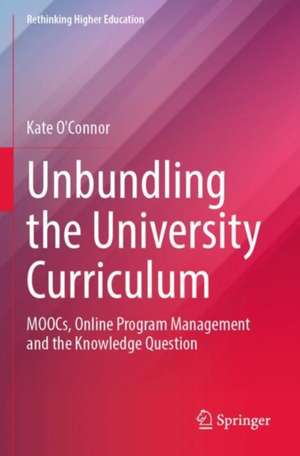Unbundling the University Curriculum: MOOCs, Online Program Management and the Knowledge Question: Rethinking Higher Education
Autor Kate O'Connoren Limba Engleză Paperback – 4 sep 2023
In a context in which explicit attention to the curriculum has been sidelined in universities’ strategy, this book makes an argument for why curriculum matters, both in understanding the effects of unbundled online learning and more broadly. It takes up two particular curriculum issues which are amplified in an unbundled context: differences in the formulation of curriculum between disciplines and professional fields, and the extent these are recognised in university strategy; and the push for constructivist pedagogies, and its effects on curriculum construction.
Since the onslaught of MOOCs in 2012, unbundled forms of online learning offered via partnerships with external online program management and MOOC providers have grown significantly across the university sector. There has been much debate about the implications of these partnerships but the focus has predominantly been on the engagement of students and their learning. This book takes adifferent and novel approach, looking instead at the effects on curriculum and knowledge.
Drawing on selected case studies, the book reflects on how university leaders and academics engaged with MOOCs and other forms of unbundled online learning in the early 2010s, and the effects of these reforms on curriculum practice. It captures in detail the complex and difficult work involved in university curriculum making in a way rarely seen in discussions of higher education. And it generates new in-sights about some of the critical problems manifest in the ongoing moves to embrace unbundled online learning today.
| Toate formatele și edițiile | Preț | Express |
|---|---|---|
| Paperback (1) | 634.68 lei 6-8 săpt. | |
| Springer Nature Singapore – 4 sep 2023 | 634.68 lei 6-8 săpt. | |
| Hardback (1) | 640.71 lei 6-8 săpt. | |
| Springer Nature Singapore – 3 sep 2022 | 640.71 lei 6-8 săpt. |
Preț: 634.68 lei
Preț vechi: 746.69 lei
-15% Nou
Puncte Express: 952
Preț estimativ în valută:
121.44€ • 126.80$ • 100.51£
121.44€ • 126.80$ • 100.51£
Carte tipărită la comandă
Livrare economică 04-18 aprilie
Preluare comenzi: 021 569.72.76
Specificații
ISBN-13: 9789811946585
ISBN-10: 9811946582
Ilustrații: XIII, 162 p. 1 illus.
Dimensiuni: 155 x 235 mm
Greutate: 0.26 kg
Ediția:1st ed. 2022
Editura: Springer Nature Singapore
Colecția Springer
Seria Rethinking Higher Education
Locul publicării:Singapore, Singapore
ISBN-10: 9811946582
Ilustrații: XIII, 162 p. 1 illus.
Dimensiuni: 155 x 235 mm
Greutate: 0.26 kg
Ediția:1st ed. 2022
Editura: Springer Nature Singapore
Colecția Springer
Seria Rethinking Higher Education
Locul publicării:Singapore, Singapore
Cuprins
Introduction.- 1 Understanding curriculum and online learning in higher education.- Part A: Knowledge, curriculum and online learning: key concepts and debates.- 2 Academic knowledge: questions and debates.- 3 Learning and teaching in the modern university.- Part B: New initiatives, new subjects: case studies of online curriculum making.- 4 The institutions: SandstoneU and TechU.- 5 Case 1: Behavioural Ecology.- 6 Case 2: Classical Studies.- 7 Case 3: Interdisciplinary Logic.- 8 Cases 4 and 5: Business Studies.- Part C: University knowledge today: challenges and constraints.- 9 Disciplines and their significance.- 10 From constructivism to clarity and control.- 11 Curriculum and knowledge – what is being missed?.
Notă biografică
Dr Kate O’Connor is Senior Lecturer in Policy and Leadership in the School of Education at La Trobe University, Australia. Kate’s research is focused on educational policy and governance in schooling and higher education, with particular interests in curriculum and digital transformations. She is currently working on projects examining state differences and curriculum hierarchies in senior secondary education, the implications and opportunities of new research data management practices for qualitative research, and the implications of unbundled online learning reforms for curriculum and knowledge in universities. Her previous book publications include Knowledge at the Crossroads (Springer, 2017) and Australia’s Curriculum Dilemmas (MUP, 2011).
Textul de pe ultima copertă
In a context in which explicit attention to the curriculum has been sidelined in universities’ strategy, this book makes an argument for why curriculum matters, both in understanding the effects of unbundled online learning and more broadly. It takes up two particular curriculum issues which are amplified in an unbundled context: differences in the formulation of curriculum between disciplines and professional fields, and the extent these are recognised in university strategy; and the push for constructivist pedagogies, and its effects on curriculum construction.
Since the onslaught of MOOCs in 2012, unbundled forms of online learning offered via partnerships with external online program management and MOOC providers have grown significantly across the university sector. There has been much debate about the implications of these partnerships but the focus has predominantly been on the engagement of students and their learning. This book takes a different and novel approach, looking instead at the effects on curriculum and knowledge.
Drawing on selected case studies, the book reflects on how university leaders and academics engaged with MOOCs and other forms of unbundled online learning in the early 2010s, and the effects of these reforms on curriculum practice. It captures in detail the complex and difficult work involved in university curriculum making in a way rarely seen in discussions of higher education. And it generates new in-sights about some of the critical problems manifest in the ongoing moves to embrace unbundled online learning today.
Caracteristici
Provides a unique perspective on online learning, focused on what academics are constructing as curriculum Captures in detail the complex work involved in university curriculum making Opens original insights into studying curriculum and knowledge in higher education




